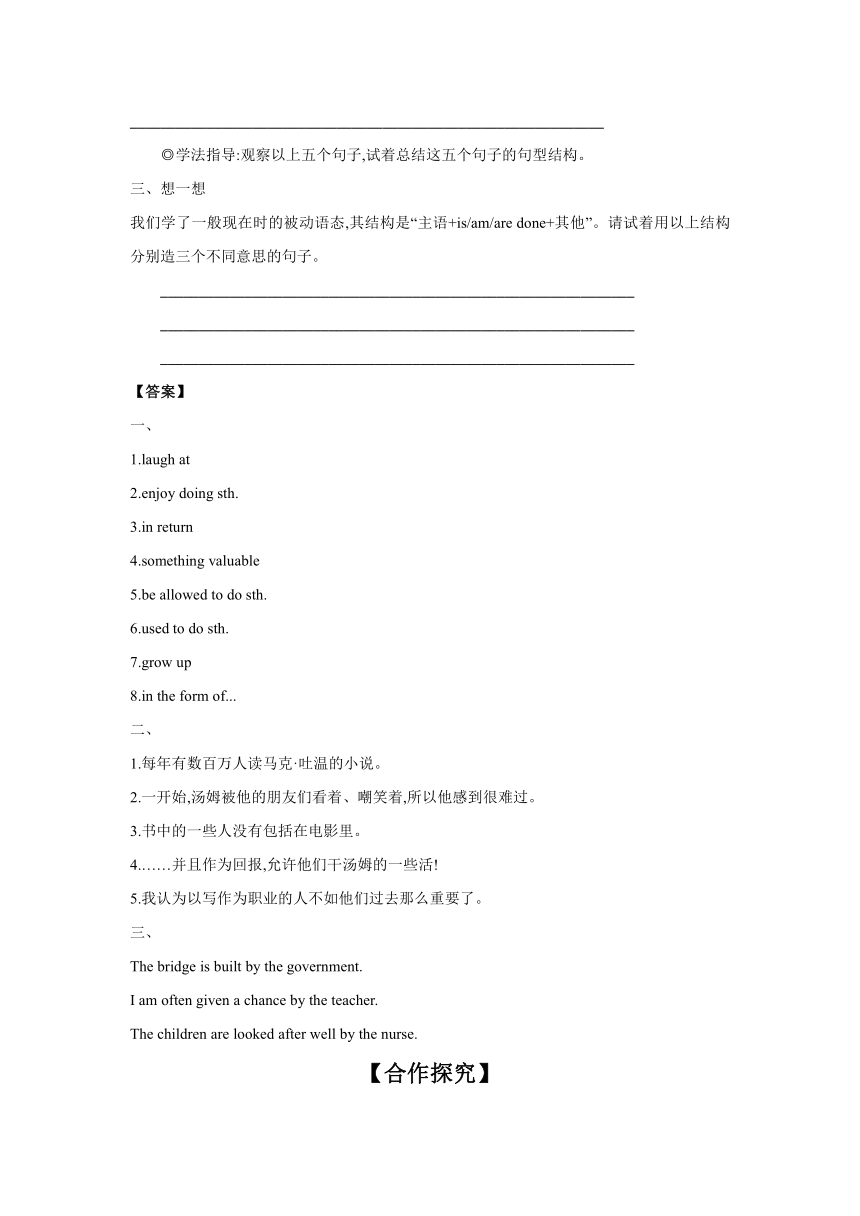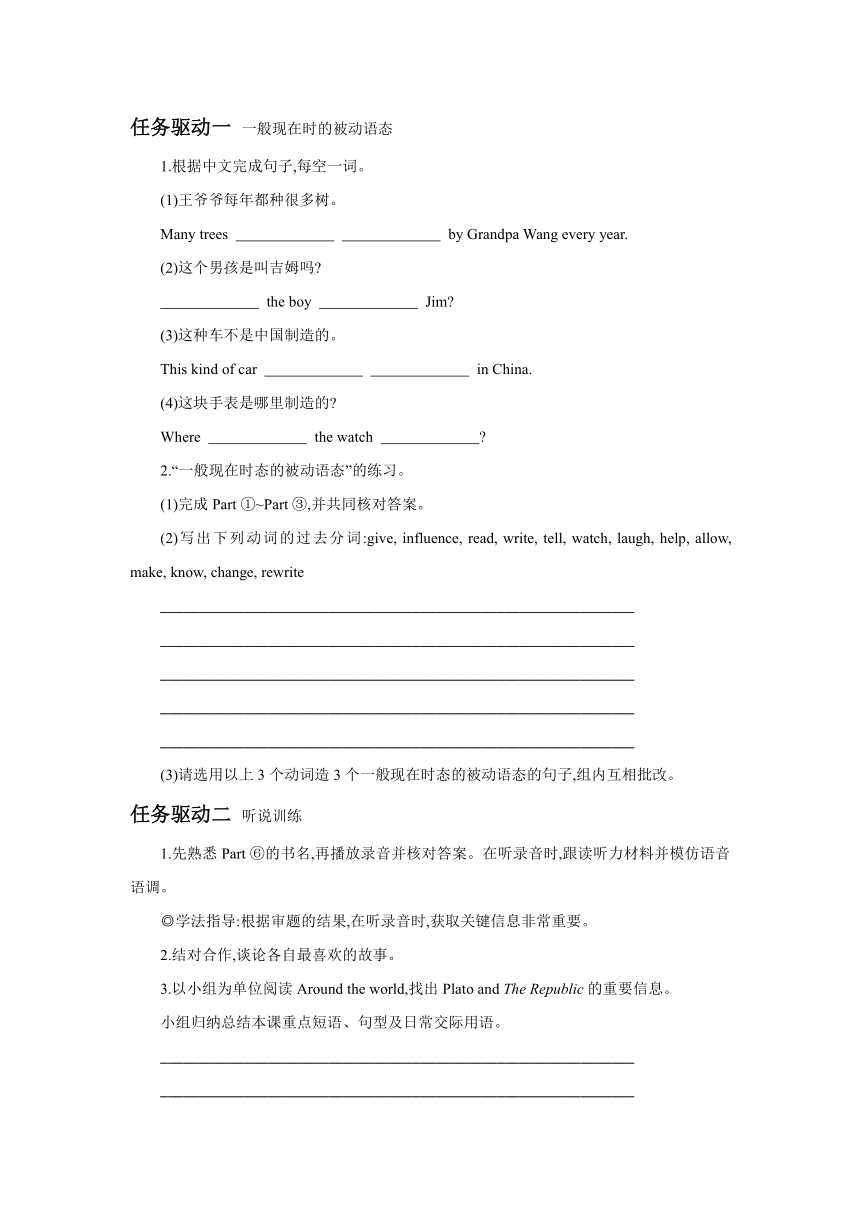外研版九年级上册Module 7 Great books Unit 3 学案(含答案)
文档属性
| 名称 | 外研版九年级上册Module 7 Great books Unit 3 学案(含答案) |

|
|
| 格式 | docx | ||
| 文件大小 | 20.4KB | ||
| 资源类型 | 教案 | ||
| 版本资源 | 外研版 | ||
| 科目 | 英语 | ||
| 更新时间 | 2024-02-26 00:00:00 | ||
图片预览



文档简介
Module 7 Unit 3
Language in use
【学习目标】
1.灵活运用本模块所学的词汇、句型以及一般现在时的被动语态。
2.在具体的语境中体会如何运用一般现在时的被动语态。
3.能够表达对某部作品的看法并与同学展开讨论。
【预习导学】
一、短语速记
1.嘲笑
2.喜欢做某事
3.作为回报
4.一些有价值的东西
5.被允许做某事
6.过去常常做某事
7.长大成人
8.以……形式
◎学法指导:短语是英语学习的基础,多积累短语有利于提高英语写作水平。
二、句子速译
1.Mark Twain’s stories are read by millions of people every year.
______________________________________________________________
2.At first, Tom is watched by his friends and laughed at, so he feels quite bad.
______________________________________________________________
3.Some people in the book are not included in the film.
______________________________________________________________
4....and in return they are allowed to do some of Tom’s work!
______________________________________________________________
5.I think people who write for a job are not as important as they used to be.
______________________________________________________________
◎学法指导:观察以上五个句子,试着总结这五个句子的句型结构。
三、想一想
我们学了一般现在时的被动语态,其结构是“主语+is/am/are done+其他”。请试着用以上结构分别造三个不同意思的句子。
______________________________________________________________
______________________________________________________________
______________________________________________________________
【答案】
一、
1.laugh at
2.enjoy doing sth.
3.in return
4.something valuable
5.be allowed to do sth.
6.used to do sth.
7.grow up
8.in the form of...
二、
1.每年有数百万人读马克·吐温的小说。
2.一开始,汤姆被他的朋友们看着、嘲笑着,所以他感到很难过。
3.书中的一些人没有包括在电影里。
4.……并且作为回报,允许他们干汤姆的一些活!
5.我认为以写作为职业的人不如他们过去那么重要了。
三、
The bridge is built by the government.
I am often given a chance by the teacher.
The children are looked after well by the nurse.
【合作探究】
任务驱动一 一般现在时的被动语态
1.根据中文完成句子,每空一词。
(1)王爷爷每年都种很多树。
Many trees by Grandpa Wang every year.
(2)这个男孩是叫吉姆吗
the boy Jim
(3)这种车不是中国制造的。
This kind of car in China.
(4)这块手表是哪里制造的
Where the watch
2.“一般现在时态的被动语态”的练习。
(1)完成Part ①~Part ③,并共同核对答案。
(2)写出下列动词的过去分词:give, influence, read, write, tell, watch, laugh, help, allow, make, know, change, rewrite
______________________________________________________________
______________________________________________________________
______________________________________________________________
______________________________________________________________
______________________________________________________________
(3)请选用以上3个动词造3个一般现在时态的被动语态的句子,组内互相批改。
任务驱动二 听说训练
1.先熟悉Part ⑥的书名,再播放录音并核对答案。在听录音时,跟读听力材料并模仿语音语调。
◎学法指导:根据审题的结果,在听录音时,获取关键信息非常重要。
2.结对合作,谈论各自最喜欢的故事。
3.以小组为单位阅读Around the world,找出Plato and The Republic的重要信息。
小组归纳总结本课重点短语、句型及日常交际用语。
______________________________________________________________
______________________________________________________________
______________________________________________________________
______________________________________________________________
任务驱动三 写作训练
1.小组讨论完成Part ⑧。
2.小组合作记下组内成员想说的内容。
3.向全班展示小组成员的讨论情况。
【答案】
任务驱动一:
1.(1)are planted
(2)Is; called/named
(3)isn’t made
(4)is; made
2.(2)given, influenced, read, written, told, watched, laughed, helped, allowed, made, known, changed, rewritten
任务驱动二:
3.
in ancient Greece, a great thinker and writer, write his ideas, in the form of..., many famous dialogues and letters, his most famous book, what makes a good man, the modern world, be influenced by...
【知识超市】
[命题点一]...and in return they are allowed to do some of Tom’s work!……并且作为回报,允许他们干汤姆的一些活!
【例句呈现】
1.Linda invited Bill to dinner in return for his help. 为了回报比尔的帮忙,琳达邀请他共进晚餐。
2.We must return/give back the books to the library on time. 我们必须按时把书还给图书馆。
3.When are you going to return/come back/go back to New York 你打算什么时候返回纽约
【用法小结】(1)return作名词时,意为“返回;归还;回报”,常用短语in return (for sth.),意为“作为(对……的)回报”。
(2)return还可作动词,既可作及物动词又可作不及物动词。return作及物动词时,意为“归还”,相当于give back, return sth. to sb.意为“归还某人某物”;作不及物动词时,意为“回来;返回”,相当于go/come back, return to sp.意为“返回某地”。
对点自测
根据中文完成句子,每空一词
1.我给迪克买了一支钢笔作为他帮助我学英语的回报。
I bought Dick a pen for helping me with my English.
2.我明天下午必须把自行车归还给玛丽。
I must the bike Mary tomorrow afternoon.
3.保罗打算下周回伦敦。
Paul is going to London next week.
【答案】
1.in return 2.return; to 3.return to
[命题点二]I think people who write for a job are not as important as they used to be. 我认为以写作为职业的人不如他们过去那么重要了。
【例句呈现】
1.Linda used to walk to school. 琳达过去常常步行去上学。
2.This bottle is used to hold milk.这个瓶子被用来装牛奶。
3.My grandma is used to getting up early. 我奶奶习惯早起。
4.The robot is used for sweeping the floor. 这个机器人是用来扫地的。
5.This building is used as our teaching building. 这栋大楼被用作我们的教学楼。
【用法小结】used to do sth.意为“过去常常做某事”,暗含“现在已经不做”之意。其中,to是动词不定式符号,其后跟动词原形。
【易混辨析】be used to do sth., be used to doing sth., be used for doing sth.和be used as sth.
be used to do sth. 意为“被用于做某事”,不定式表示目的,可用于各种时态
be used to doing sth. 意为“习惯于做某事”,to为介词,后接名词、代词或动词-ing形式,be可用become/get等代替
be used for sth. 意为“用于、被用来做某事”,介词for表示“用途”
be used as sth. 意为“被用作某物”,介词as表示“作为”
对点自测
选词语填空
is used for, are used to, used to, is used to, be used as
1.Mary go to bed late but now she goes to bed early.
2.She having eggs, bread and milk for breakfast.
3.The knife cutting watermelons.
4.The kind of flowers can medicine.
5.These cheeses make cakes.
【答案】
1.used to
2.is used to
3.is used for
4.be used as
5.are used to
Language in use
【学习目标】
1.灵活运用本模块所学的词汇、句型以及一般现在时的被动语态。
2.在具体的语境中体会如何运用一般现在时的被动语态。
3.能够表达对某部作品的看法并与同学展开讨论。
【预习导学】
一、短语速记
1.嘲笑
2.喜欢做某事
3.作为回报
4.一些有价值的东西
5.被允许做某事
6.过去常常做某事
7.长大成人
8.以……形式
◎学法指导:短语是英语学习的基础,多积累短语有利于提高英语写作水平。
二、句子速译
1.Mark Twain’s stories are read by millions of people every year.
______________________________________________________________
2.At first, Tom is watched by his friends and laughed at, so he feels quite bad.
______________________________________________________________
3.Some people in the book are not included in the film.
______________________________________________________________
4....and in return they are allowed to do some of Tom’s work!
______________________________________________________________
5.I think people who write for a job are not as important as they used to be.
______________________________________________________________
◎学法指导:观察以上五个句子,试着总结这五个句子的句型结构。
三、想一想
我们学了一般现在时的被动语态,其结构是“主语+is/am/are done+其他”。请试着用以上结构分别造三个不同意思的句子。
______________________________________________________________
______________________________________________________________
______________________________________________________________
【答案】
一、
1.laugh at
2.enjoy doing sth.
3.in return
4.something valuable
5.be allowed to do sth.
6.used to do sth.
7.grow up
8.in the form of...
二、
1.每年有数百万人读马克·吐温的小说。
2.一开始,汤姆被他的朋友们看着、嘲笑着,所以他感到很难过。
3.书中的一些人没有包括在电影里。
4.……并且作为回报,允许他们干汤姆的一些活!
5.我认为以写作为职业的人不如他们过去那么重要了。
三、
The bridge is built by the government.
I am often given a chance by the teacher.
The children are looked after well by the nurse.
【合作探究】
任务驱动一 一般现在时的被动语态
1.根据中文完成句子,每空一词。
(1)王爷爷每年都种很多树。
Many trees by Grandpa Wang every year.
(2)这个男孩是叫吉姆吗
the boy Jim
(3)这种车不是中国制造的。
This kind of car in China.
(4)这块手表是哪里制造的
Where the watch
2.“一般现在时态的被动语态”的练习。
(1)完成Part ①~Part ③,并共同核对答案。
(2)写出下列动词的过去分词:give, influence, read, write, tell, watch, laugh, help, allow, make, know, change, rewrite
______________________________________________________________
______________________________________________________________
______________________________________________________________
______________________________________________________________
______________________________________________________________
(3)请选用以上3个动词造3个一般现在时态的被动语态的句子,组内互相批改。
任务驱动二 听说训练
1.先熟悉Part ⑥的书名,再播放录音并核对答案。在听录音时,跟读听力材料并模仿语音语调。
◎学法指导:根据审题的结果,在听录音时,获取关键信息非常重要。
2.结对合作,谈论各自最喜欢的故事。
3.以小组为单位阅读Around the world,找出Plato and The Republic的重要信息。
小组归纳总结本课重点短语、句型及日常交际用语。
______________________________________________________________
______________________________________________________________
______________________________________________________________
______________________________________________________________
任务驱动三 写作训练
1.小组讨论完成Part ⑧。
2.小组合作记下组内成员想说的内容。
3.向全班展示小组成员的讨论情况。
【答案】
任务驱动一:
1.(1)are planted
(2)Is; called/named
(3)isn’t made
(4)is; made
2.(2)given, influenced, read, written, told, watched, laughed, helped, allowed, made, known, changed, rewritten
任务驱动二:
3.
in ancient Greece, a great thinker and writer, write his ideas, in the form of..., many famous dialogues and letters, his most famous book, what makes a good man, the modern world, be influenced by...
【知识超市】
[命题点一]...and in return they are allowed to do some of Tom’s work!……并且作为回报,允许他们干汤姆的一些活!
【例句呈现】
1.Linda invited Bill to dinner in return for his help. 为了回报比尔的帮忙,琳达邀请他共进晚餐。
2.We must return/give back the books to the library on time. 我们必须按时把书还给图书馆。
3.When are you going to return/come back/go back to New York 你打算什么时候返回纽约
【用法小结】(1)return作名词时,意为“返回;归还;回报”,常用短语in return (for sth.),意为“作为(对……的)回报”。
(2)return还可作动词,既可作及物动词又可作不及物动词。return作及物动词时,意为“归还”,相当于give back, return sth. to sb.意为“归还某人某物”;作不及物动词时,意为“回来;返回”,相当于go/come back, return to sp.意为“返回某地”。
对点自测
根据中文完成句子,每空一词
1.我给迪克买了一支钢笔作为他帮助我学英语的回报。
I bought Dick a pen for helping me with my English.
2.我明天下午必须把自行车归还给玛丽。
I must the bike Mary tomorrow afternoon.
3.保罗打算下周回伦敦。
Paul is going to London next week.
【答案】
1.in return 2.return; to 3.return to
[命题点二]I think people who write for a job are not as important as they used to be. 我认为以写作为职业的人不如他们过去那么重要了。
【例句呈现】
1.Linda used to walk to school. 琳达过去常常步行去上学。
2.This bottle is used to hold milk.这个瓶子被用来装牛奶。
3.My grandma is used to getting up early. 我奶奶习惯早起。
4.The robot is used for sweeping the floor. 这个机器人是用来扫地的。
5.This building is used as our teaching building. 这栋大楼被用作我们的教学楼。
【用法小结】used to do sth.意为“过去常常做某事”,暗含“现在已经不做”之意。其中,to是动词不定式符号,其后跟动词原形。
【易混辨析】be used to do sth., be used to doing sth., be used for doing sth.和be used as sth.
be used to do sth. 意为“被用于做某事”,不定式表示目的,可用于各种时态
be used to doing sth. 意为“习惯于做某事”,to为介词,后接名词、代词或动词-ing形式,be可用become/get等代替
be used for sth. 意为“用于、被用来做某事”,介词for表示“用途”
be used as sth. 意为“被用作某物”,介词as表示“作为”
对点自测
选词语填空
is used for, are used to, used to, is used to, be used as
1.Mary go to bed late but now she goes to bed early.
2.She having eggs, bread and milk for breakfast.
3.The knife cutting watermelons.
4.The kind of flowers can medicine.
5.These cheeses make cakes.
【答案】
1.used to
2.is used to
3.is used for
4.be used as
5.are used to
同课章节目录
- Module 1 Wonders of the world
- Unit 1 It's more than 2,000 years old.
- Unit 2 The Grand Canyon was not just big.
- Unit 3 Language in use
- Module 2 Public holidays
- Unit 1 My family always go somewhere interesting a
- Unit 2 We have celebrated the festival since the f
- Unit 3 Language in use
- Module 3 Heroes
- Unit 1 She trained hard,so she became a great play
- Unit 2There were few doctors, so he had to work ve
- Unit 3 Language in use
- Module 4 Home alone
- Unit 1 I can look after myself, although it won’t
- Unit 2 I became so bored with their orders that I
- Unit 3 Language in use
- Module 5 Museums
- Unit 1 Don't cross that rope!
- Unit 2 If you ever go to London, make sure you vis
- Unit 3 Language in use
- Module 6 Problems
- Unit 1 If I start after dinner, I'll finish it be
- Unit 2 If you tell him the truth now, you will sho
- Unit 3 Language in use
- Revision Module A
- Module 7 Great books
- Unit 1 We're still influenced by Confucius's idea
- Unit 2 It is still read and loved.
- Unit 3 Language in use
- Module 8 Sports life
- Unit 1 Daming wasn't chosen for the team last time
- Unit 2 He was invited to competitions around the w
- Unit 3 Language in use
- Module 9 Great inventions
- Unit 1 Will computers be used more than books in t
- Unit 2 Will books be replaced by the Internet?
- Unit 3 Language in use
- Module 10 Australia
- Unit 1 I have some photos that I took in Australia
- Unit 2 The game that they like most is Australian
- Unit 3 Language in use
- Module 11 Photos
- Unit 1 He's the boy who won the photo competition
- Unit 2 The photo which we liked best was taken by
- Unit 3 Language in use
- Module 12 Save our world
- Unit 1 If everyone starts to do something, the wor
- Unit 2 Repeat these three words daily: reduce, reu
- Unit 3 Language in use
- Revision Module B
